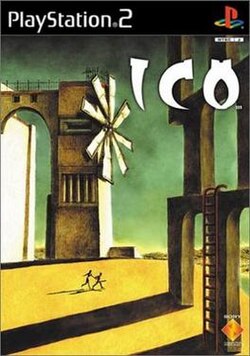Ico
| Ico | |
|---|---|

The cover for the European and Japanese versions, painted by director Fumito Ueda and inspired by the surrealist painter Giorgio de Chirico's The Nostalgia of the Infinite
|
|
| Developer(s) |
SCE Japan Studio (Team Ico) |
| Publisher(s) | Sony Computer Entertainment |
| Director(s) | Fumito Ueda |
| Producer(s) | Kenji Kaido |
| Designer(s) | Fumito Ueda |
| Composer(s) |
Michiru Oshima Koichi Yamazaki Mitsukuni Murayama |
| Platform(s) | PlayStation 2 |
| Release date(s) | |
| Genre(s) | Action-adventure |
| Mode(s) | Single-player, multiplayer |
| Ico: Kiri no Naka no Senritsu | |
|---|---|
| Soundtrack album by Michiru Oshima, Koichi Yamazaki, and Mitsukuni Murayama | |
| Released | February 20, 2002 |
| Genre | Video game soundtrack, ambient music |
| Length | 25:35 |
| Label | SME Visual Works |
| Aggregate score | |
|---|---|
| Aggregator | Score |
| Metacritic | 90/100 |
| Review scores | |
| Publication | Score |
| Eurogamer | 10/10 |
| Famitsu | 30/40 |
| GameSpot | 8.5 |
| IGN | 9.4/10 |
Ico (イコ Iko?, /ˈiːkoʊ/), stylized as ICO, is an action-adventure video game developed by Team Ico and published by Sony Computer Entertainment, released for the PlayStation 2 video game console in 2001 and 2002 in various regions. It was designed and directed by Fumito Ueda, who wanted to create a minimalist game around a "boy meets girl" concept. Originally planned for the PlayStation, Ico took approximately four years to develop. The team employed a "subtracting design" approach to reduce elements of gameplay that interfered with the game's setting and story in order to create a high level of immersion.
The protagonist is a young boy named Ico who was born with horns, which his village considers a bad omen. Warriors lock him away in an abandoned fortress. During his explorations of the fortress, Ico encounters Yorda, the daughter of the castle's Queen. The Queen plans to use Yorda's body to extend her own lifespan. Learning this, Ico seeks to escape the castle with Yorda, keeping her safe from the shadow-like creatures that attempt to draw her back. Throughout the game, the player controls Ico as he explores the castle, solves puzzles and assists Yorda across obstacles.
Ico introduced several design and technical elements, including a story told with minimal dialogue, bloom lighting, and key frame animation, that have influenced subsequent games. Although not a commercial success, it was critically acclaimed for its art and story elements and received several awards, including "Game of the Year" nominations and three Game Developers Choice Awards. Ico is listed on several overall top game lists, and is often considered a work of art. It was re-released in Europe in 2006, in conjunction with the release of Shadow of the Colossus, the spiritual successor to Ico.
...
Wikipedia
